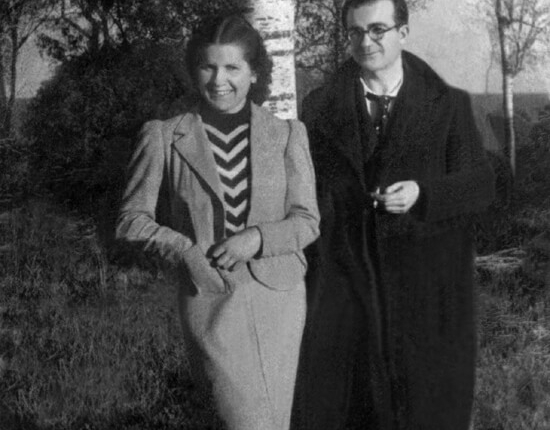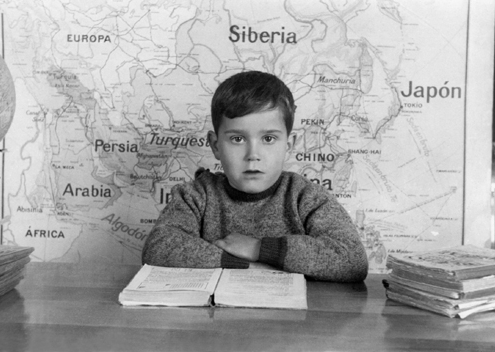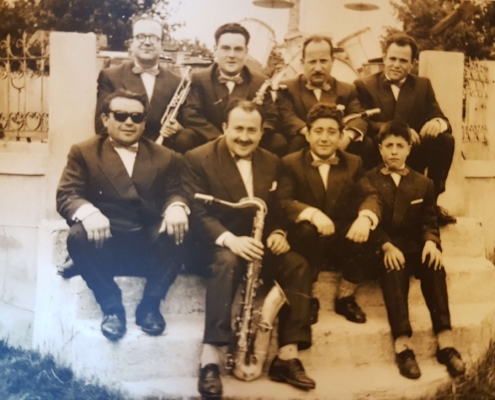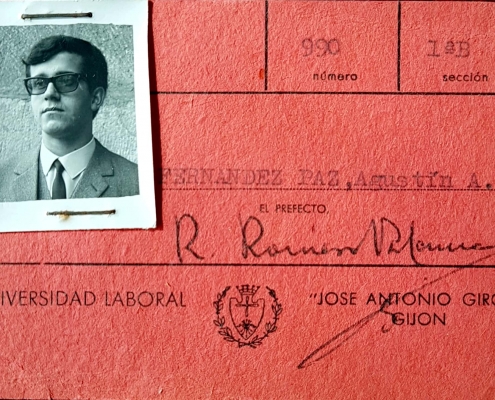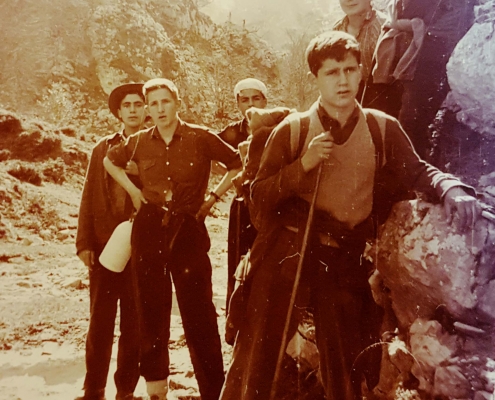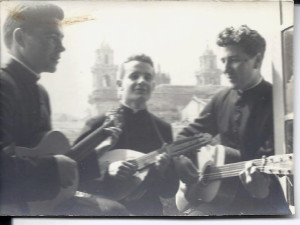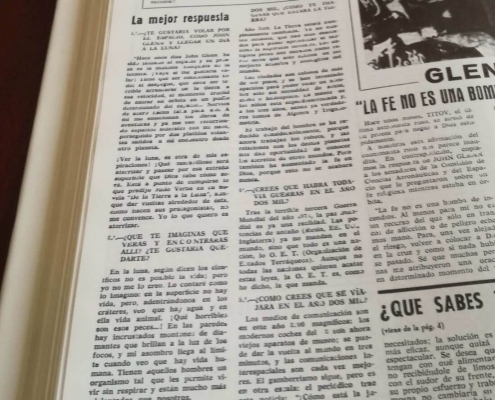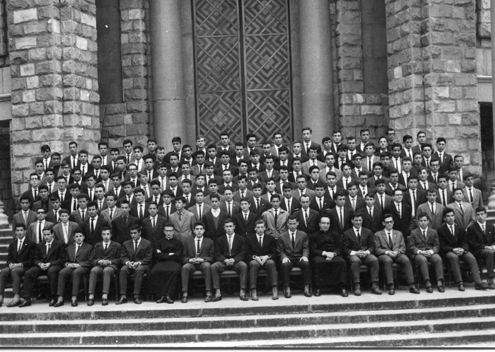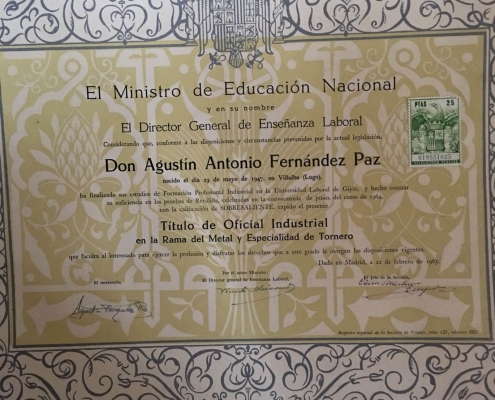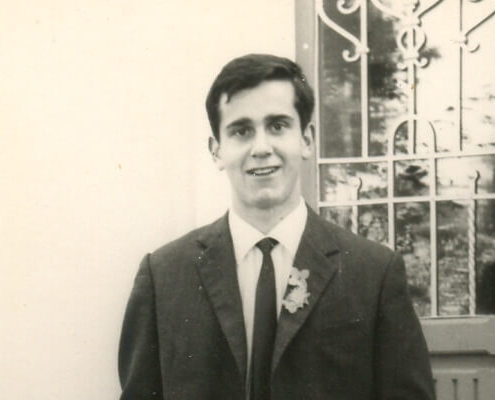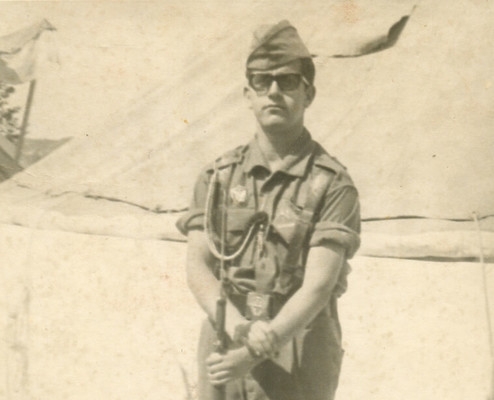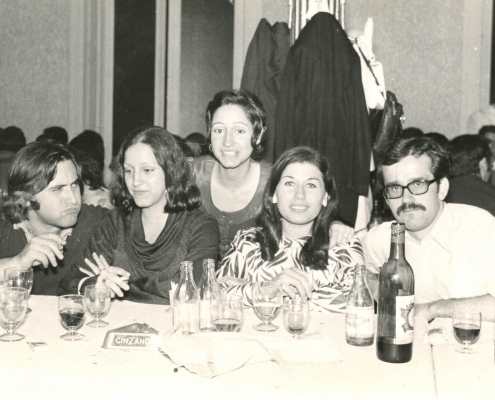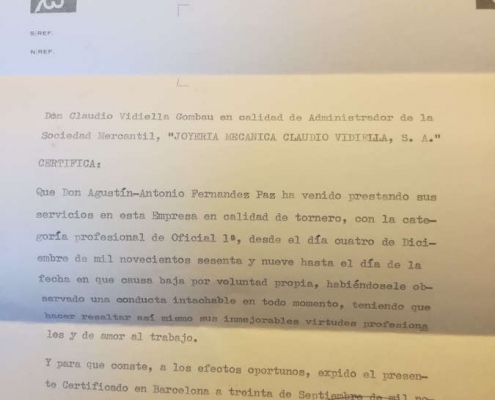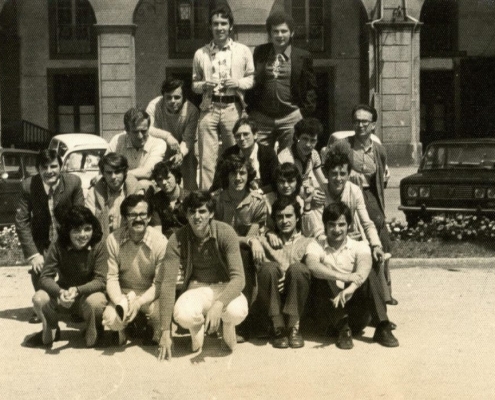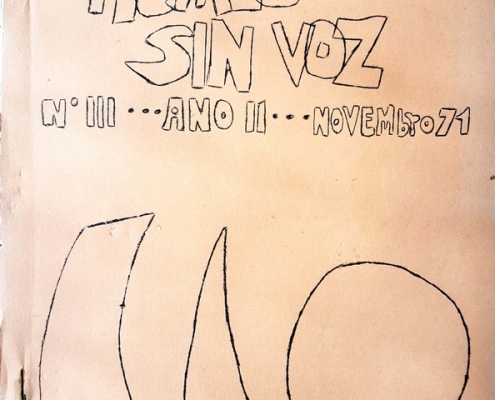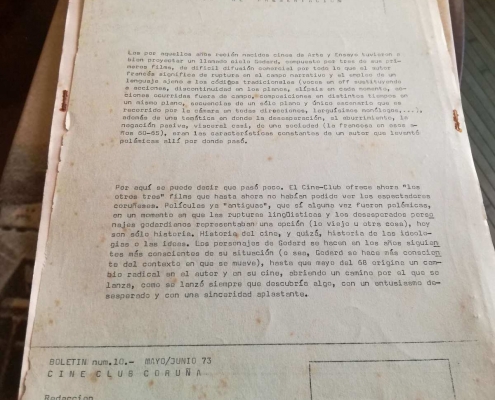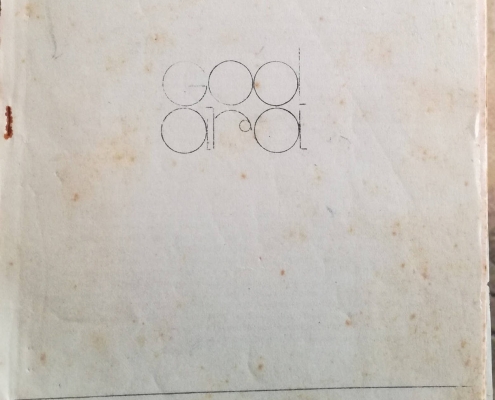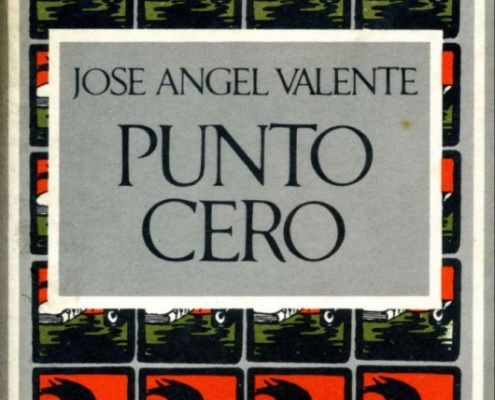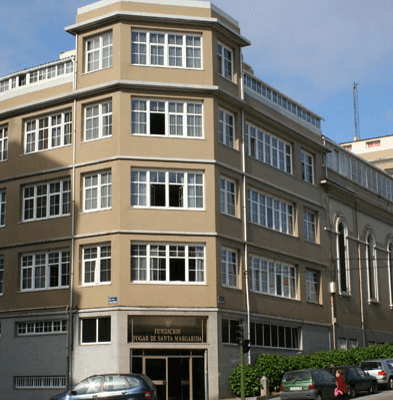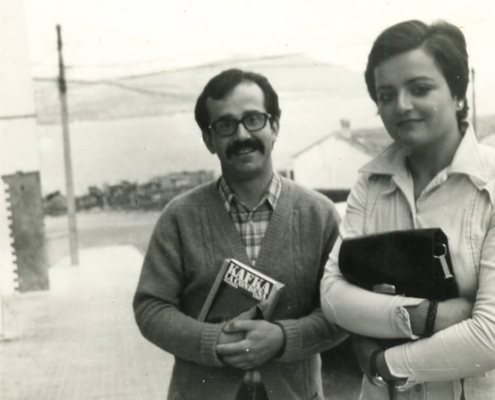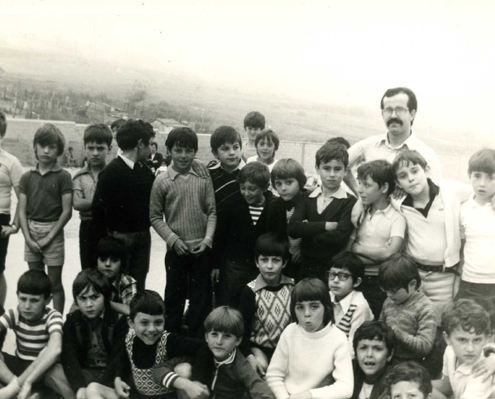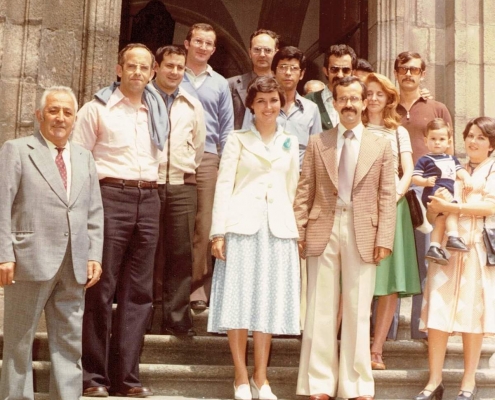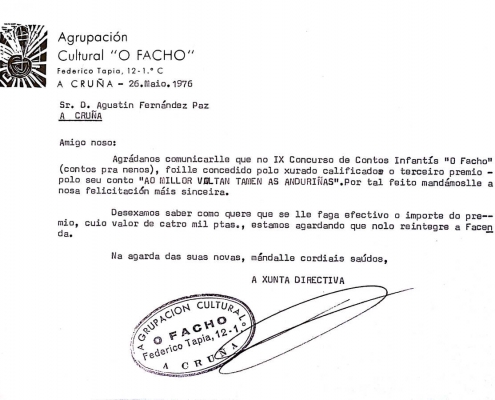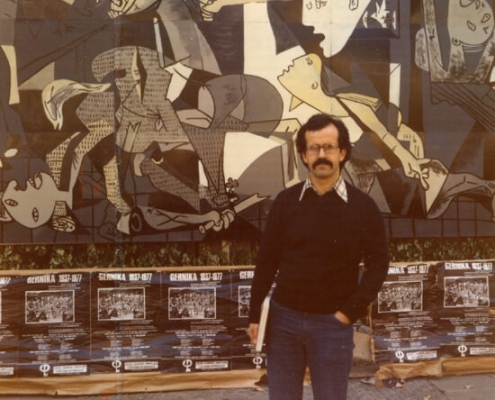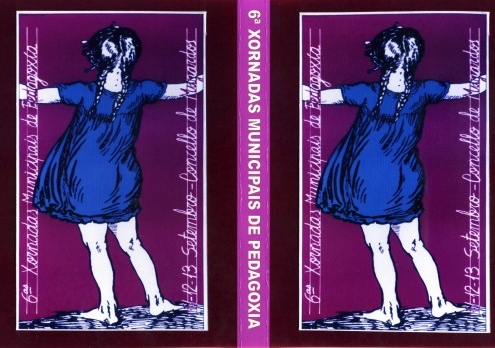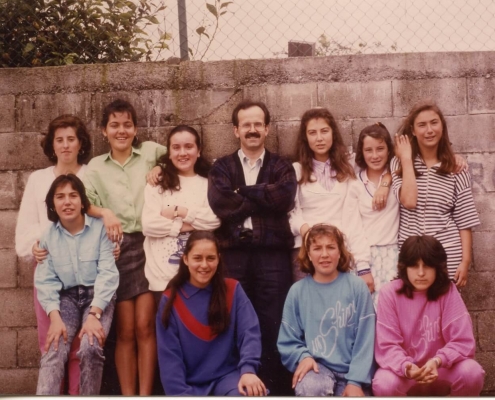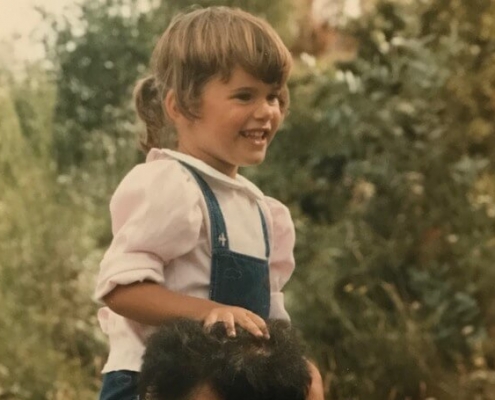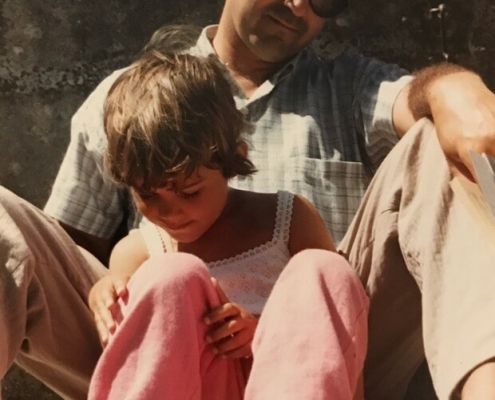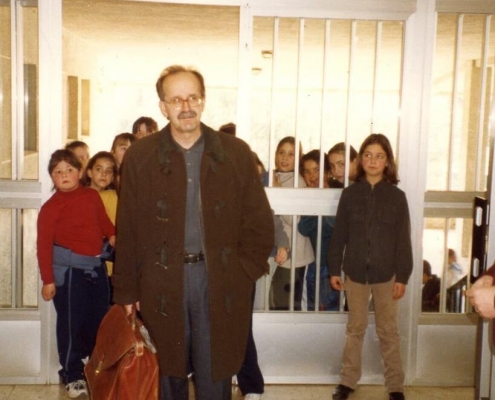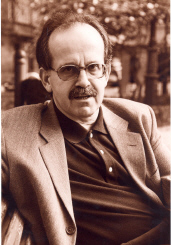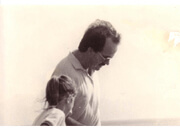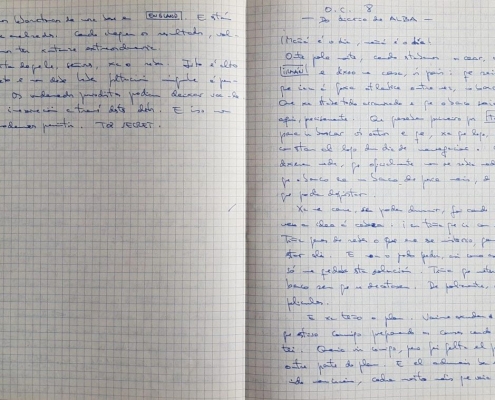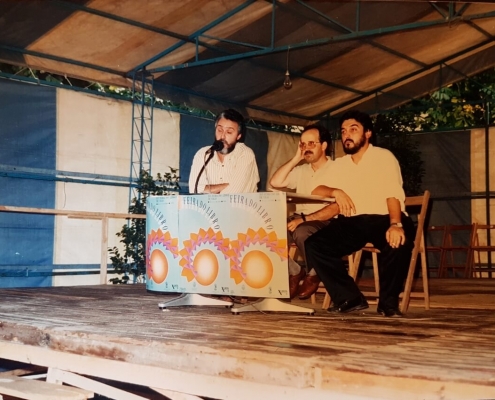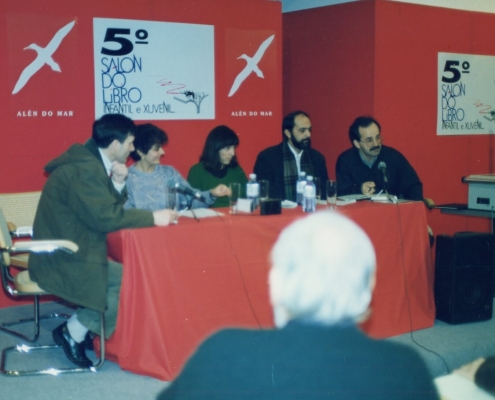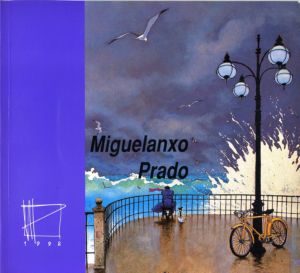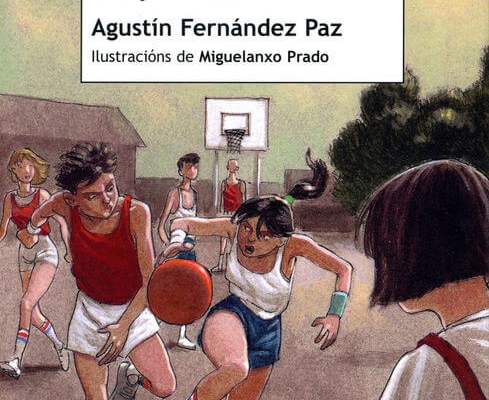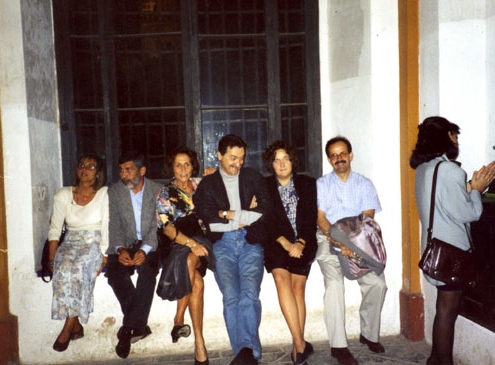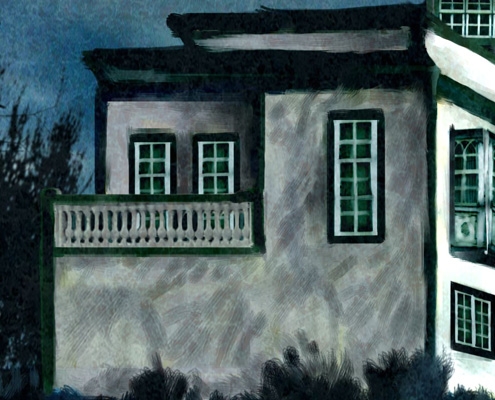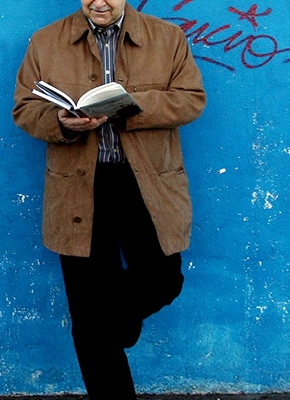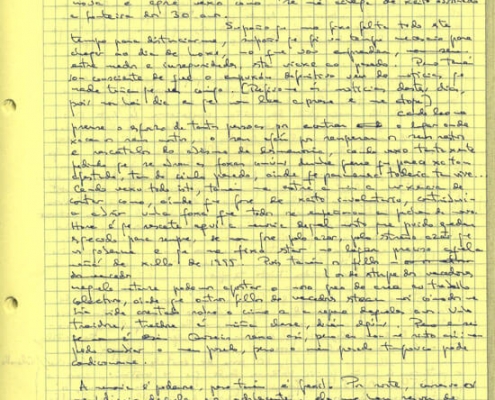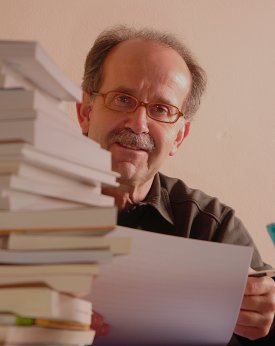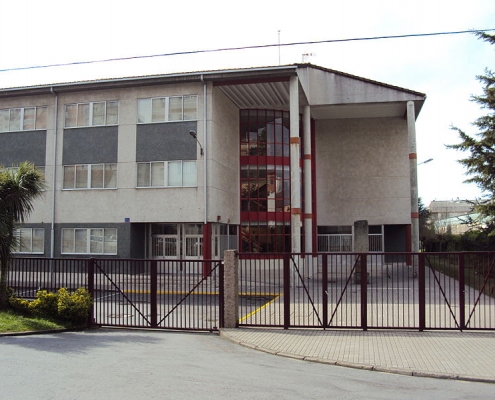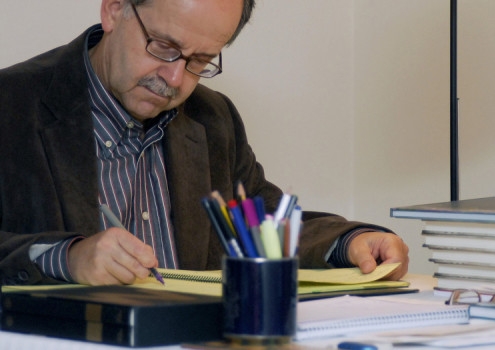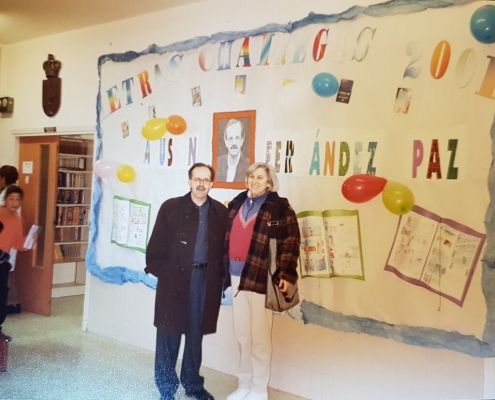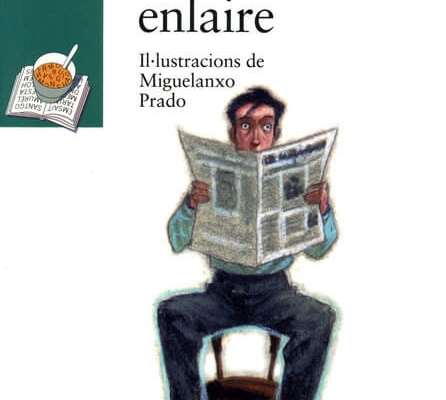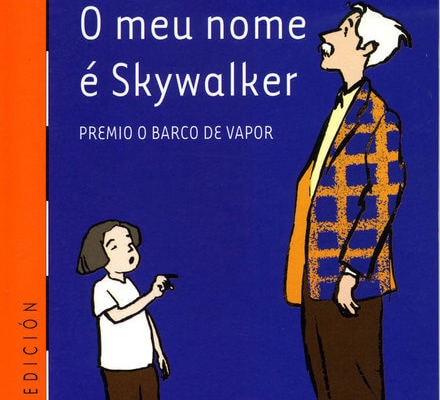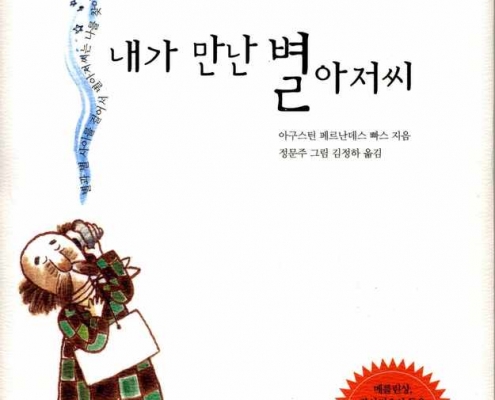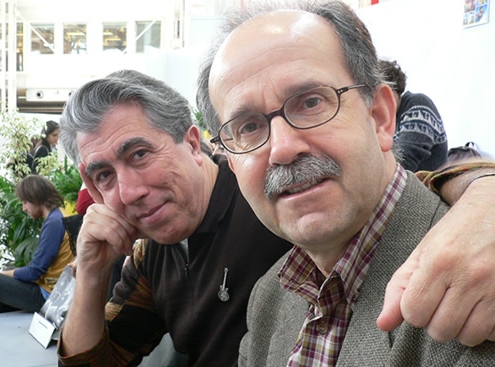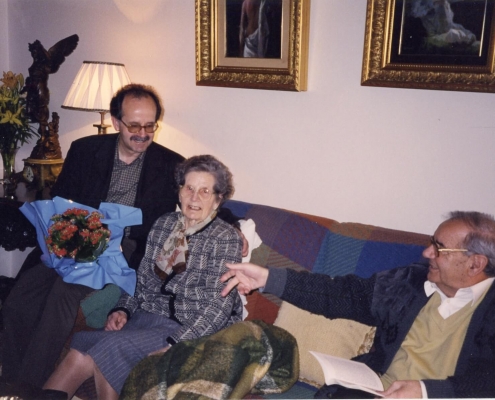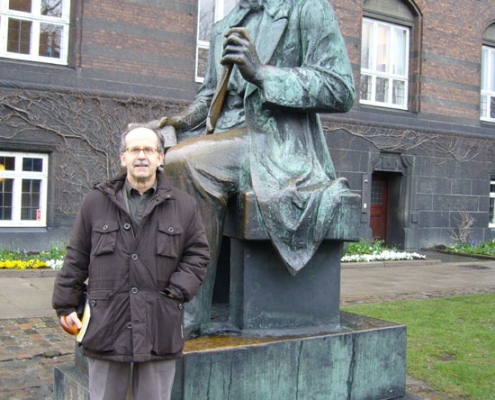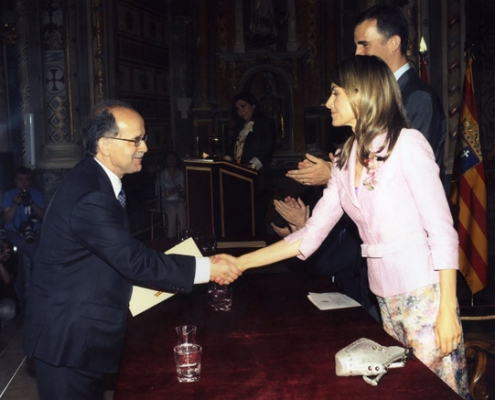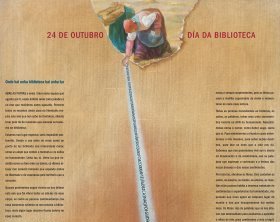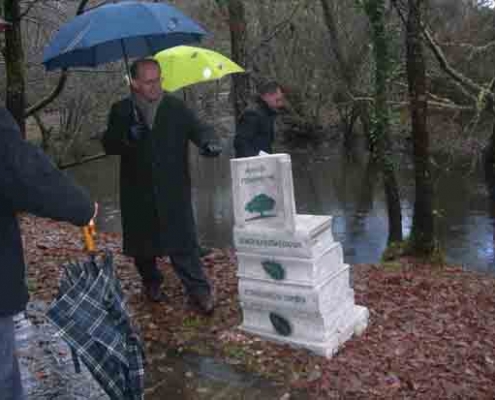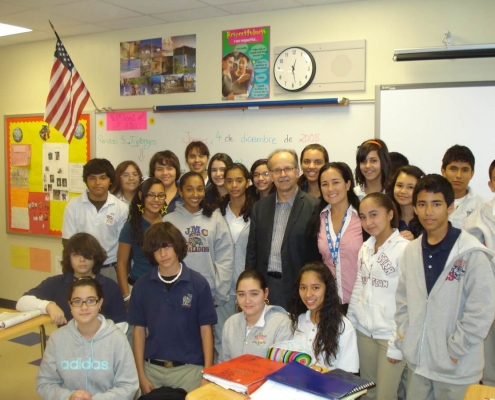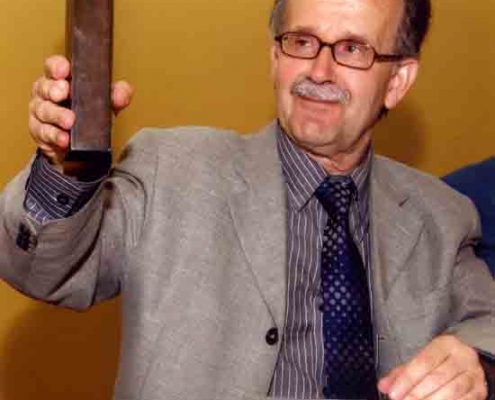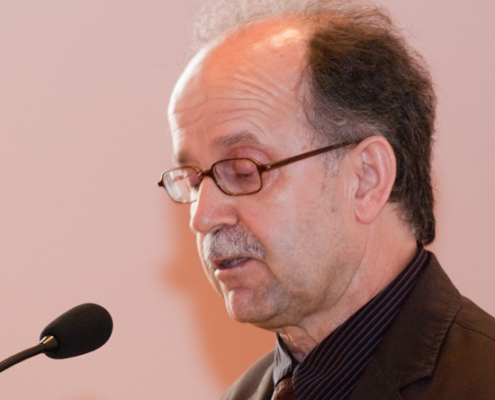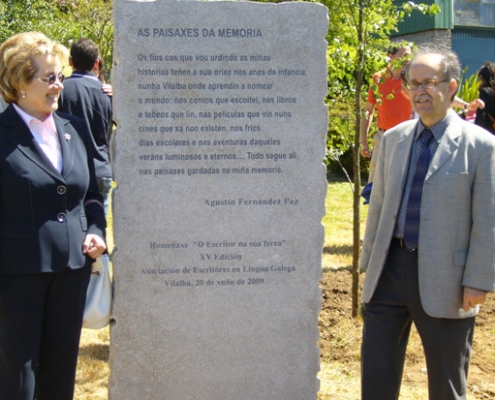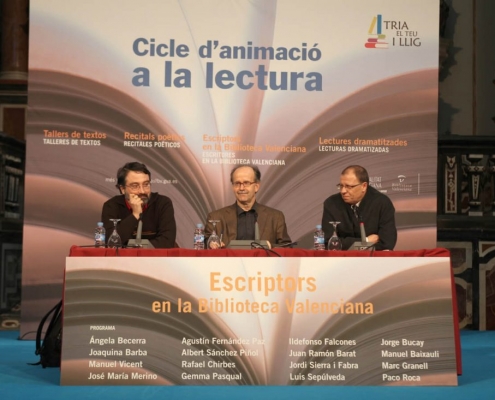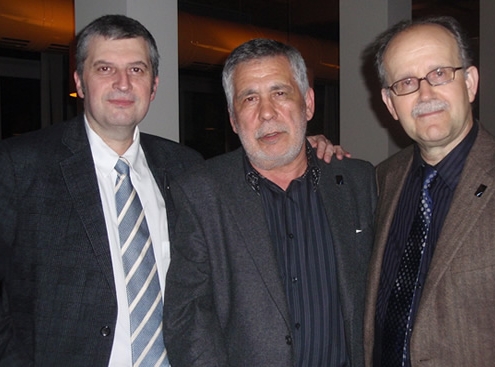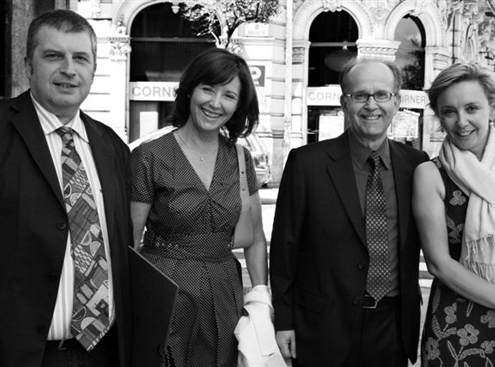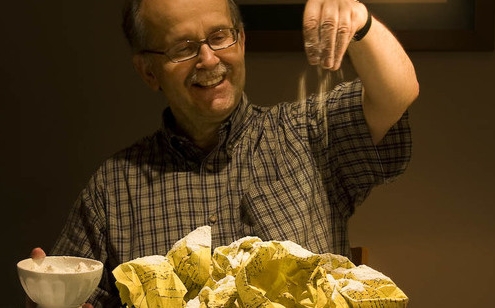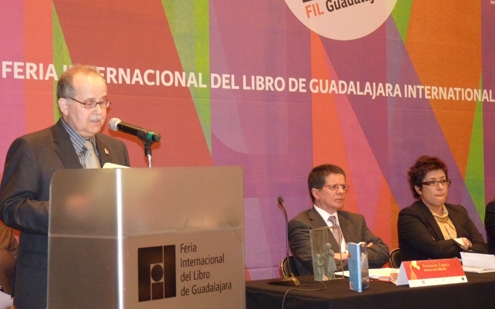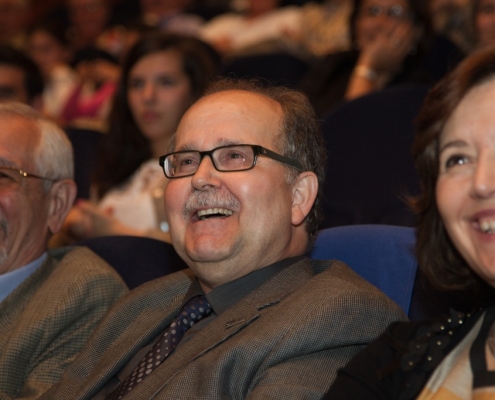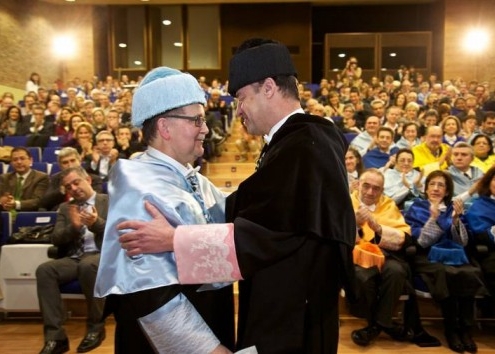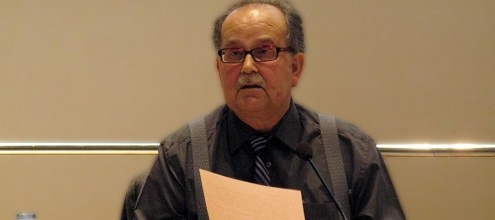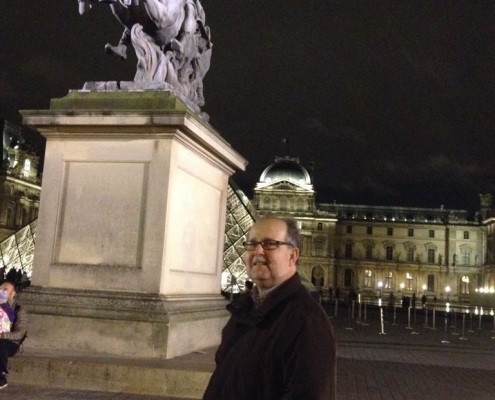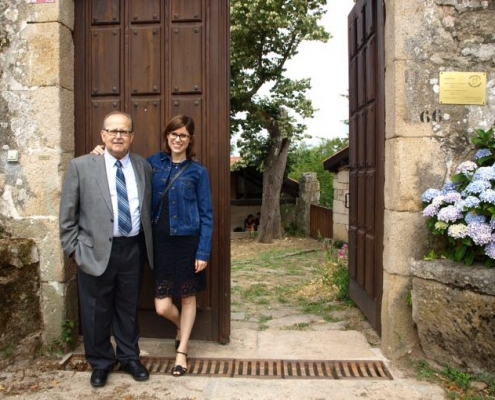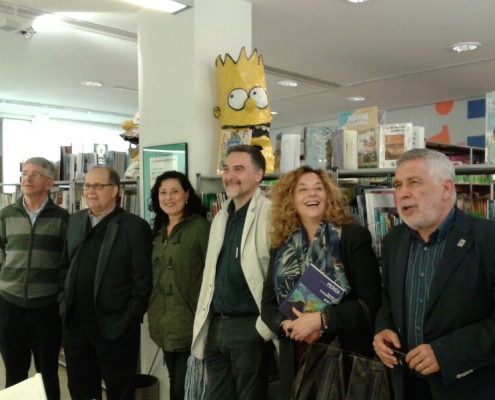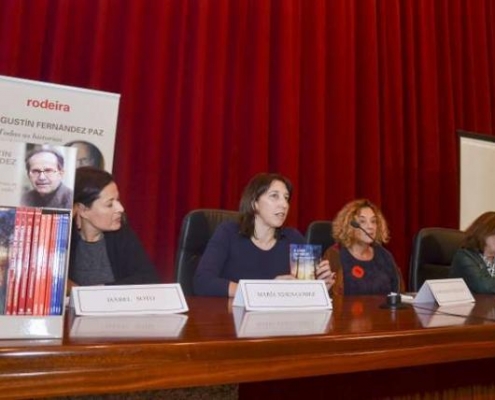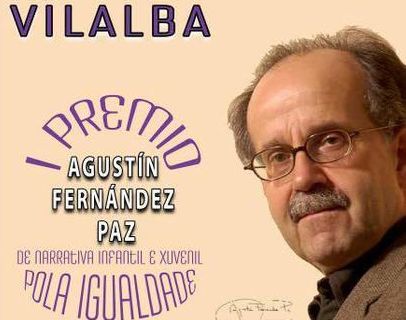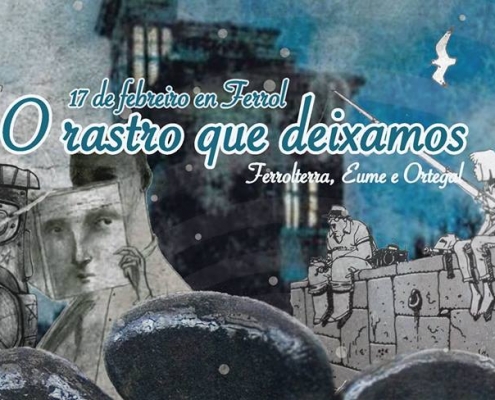1947
Spends his childhood in Vilalba
Spends his childhood in Vilalba in the harsh post-war years.
Attends the Graduada School in his town. He always retains fond memories of Don Félix, a kind and serene teacher.
Thanks to his father, a carpenter and musician in the Mato Orchestra, Agustín develops his great love of reading, with Jules Verne, Emilio Salgari and comics becoming essential reference points.
1948-1954
1955
Aged 8 he discovers the existence of books in the Galician language
He discovers the existence of books in the Galician language when his father shows him Merlín e familia (‘Merlin and Family’) by Álvaro Cunqueiro and Á lus do candil (‘By Lamplight’) by Ánxel Fole, copies of which reach his house through a family friend and bookbinder, Señor Crende.
Captain Thunder
An unforgettable moment aged 9: one Sunday in June he buys the first issue of El Capitán Trueno, “¡A sangre y fuego!” (‘Captain Thunder, “To Blood and Fire!”’) for 1.25 pesetas in the Gaioso shop in Vilalba.
1956
1961
Begins his studies in Gijón
Aged 13 Agustín goes to the Trade University in Gijón, where he begins studying Industrial Offices. There he meets another teacher who makes an impression on him: Padre Gorrochátegui, whose classes dedicated to reading aloud consolidate his passion for reading.
His older brother Luís dies suddenly aged 18 while studying at the Mondoñedo Seminary.
“I don’t need to explain how immensely painful it was for my family. Luís had great artistic sensibility, which particularly manifested itself through music (he mastered various string instruments, especially the bandurria) and painting. My sister and I still have the few paintings he was able to do; magnificent, especially if you take into account he was 17 when he did them. His manual skills were equally sound, in woodwork for instance. Luís was the artist of the family, without a doubt.”
1962
1964
University military service
During the summers of this year and the next, he does university military service at the Monte La Reina base in Zamora.
His friend Lois Mastach lends him books essential to his learning (Sartre, Russell, Kafka, Malraux and others), always Argentinian or Mexican editions as they were forbidden in Spain. These include The Plague by Albert Camus, which makes a deep impression upon him.
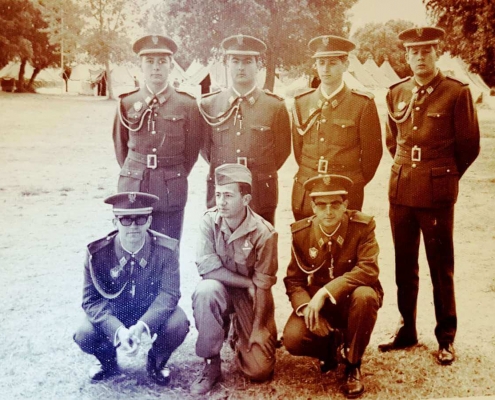
1967
1968
Military service
Does his practical military service as Second Lieutenant of the Cavalry Regiment in the Garabolos barracks in Lugo.
Some significant discoveries: Celso Emilio Ferreiro, Luís Pimentel, James Joyce and H.P. Lovecraft.
Moves to Barcelona, where he works in the mechanical jewellery company Claudio Vidiella as Official First-Class Turner. The two years he spends in the city are very important to his cultural education.
1969
1970
Passionate about cinema
Begins his teacher training course
Agustín has an accident while using a machine at work and loses a phalange of one finger on his left hand. This causes a deep personal crisis which leads him to give up his job and moves back to Vilalba, where he decides to study to become a teacher, choosing the same profession as his sister Tita.
Moves to A Coruña (where he remains until 1976) and begins his teacher training course at the Normal School. He meets Inmaculada Reino González and they become close after he translates a poem into Galician for publication in the school newspaper.
Actively participates in the creation of the magazine A voz dos homes sen voz (‘The Voice of the Voiceless Men’).
Writes two essays: “Educational Aspects in the Work of Bertrand Russell” and “Reclaiming the Comic: A Study of Two Myths About Spanish Tebeos”.
1971
1972
Death of his father
In July his father dies of cancer.
Agustín forms part of the management board of the Cineclub in A Coruña, alongside Enrique Alonso and María Xesús Fernández, and he contributes to the writing of its magazine. Among other articles, he writes a monograph on Orson Welles.
Punto cero (‘Square One’) by José Ángel Valente is published, a book Agustín purchases from the Ágora bookshop in A Coruña. It moves him deeply and he follows the poet for the rest of his life.
Teaching practice at the Fogar School in Santa Margarida
1973
1974
Temporary teacher in A Coruña
1975
1976
Wedding and sent to Gernika
On 3rd July Agustín marries Inma in the chapel at the Capuchinas Convent in A Coruña with a ceremony in the Galician language officiated by Andrés García Vilariño.
Sent as a permanent teacher to the Allende Salazar State School in Gernika, where he stays for the 1976-77 and 1977-78 school years. Here he prepares a group of teachers for public exams in Mathematics, including his partner Inma, who in 1976 passed the Mathematics Teacher Training Course in Bilbao.
Agustín and Inma participate in the creation of the Gernika Cineclub.
Receives 3rd Prize in the O Facho Children’s Short Story Competition, a key institution in the development of Galician children’s and young adult literature, for his story “Ao mellor voltan tamén as anduriñas” (‘Maybe the Swallows Will Also Return’).
Permanent position at theUnión Mugardesa school
1978
1979
Pedagoxical renovations time
Participates in the creation of the Avantar Collective by a group of teachers in the county of Ferrol. Agustín and his wife join in order to campaign for the use of Galician in education and for pedagogical renewal.
Joins the Cooperative Movement of the Galician Popular School. Publishes several articles on teaching in their magazine As Roladas-2.
In December begins his formal training in Galician with a language-perfecting course organised by the Institute of Educational Sciences.
Avantar Collective
Along with other members of the Avantar Collective, begins to prepare didactic materials with the intention of covering the new needs of the education system after the introduction of the subjects of Galician Language and Literature. The first textbook, O Noso Galego 6 (‘Our Galician 6’) is followed by many others. His first creative stories appear in these books as unsigned reading texts.
Receives 3rd Prize in the O Facho Children’s Story Competition for the short story “O rescate das palabras” (‘The Rescue of Words’).
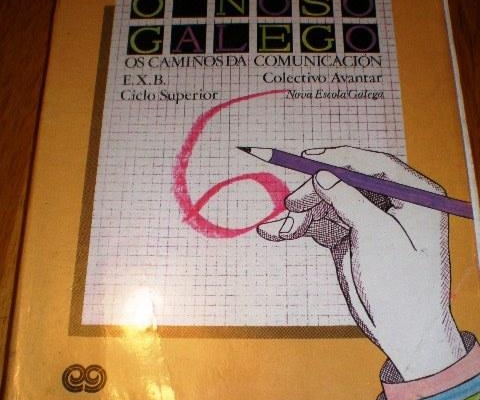
Consigue el 3º premio en el «Concurso de Contos Infantís O Facho» por el relato «O rescate das palabras».
1980
1982
Galician language courses throughout Galicia
Forms part of the team which organises and delivers the first course in Galician Language and Culture on behalf of Mugardos Town Council.
Obtains the Galician Language Aptitude Certificate from the Official School of Languages in A Coruña and begins to deliver Galician courses all over the autonomous community.
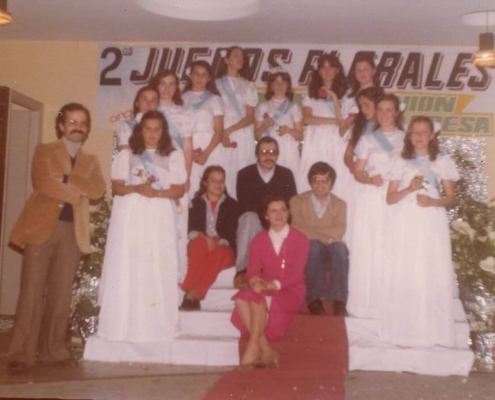
1983
1984
Masters of masters
In September delivers the course “Language as Expression and Communication” at the 6th Galician Summer School in Vigo.
In December teaches the course “Language: Creative Practice (An Alternative to Traditional Language Classes)” at the 1st Pedagogical Conference held at the Teacher Training University School in A Coruña.
A radio show and more pedagoxical activities
During the 1985-86 school year, Agustín and Inma broadcast the programme A Fervenza (‘Cascade’) on the municipal Radio Fene station, discussing topics related to the Galician language and culture.
The government of the Balearic Islands commissions him to teach the summer course “Comics in School” in Mallorca.
Receives the Galician Language Specialist Teacher Diploma from the Xunta of Galicia, the regional authority.
Actively participates in the creation of the movement for the New Galician School (Nova Escola Galega).
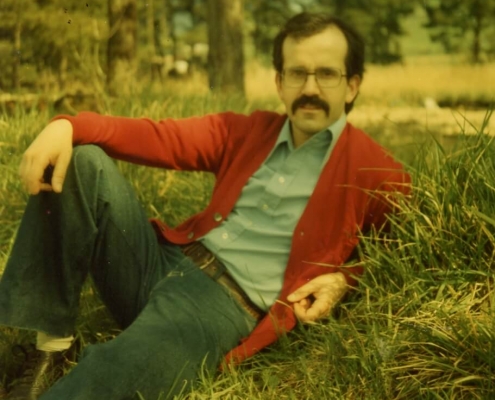 Co-writes with Bernardo Máiz the script for the video Xan de Xenaro: memoria de 32 anos (‘Xan of Xenaro: A 32-Year Memoir’) about the life of a Galician “maquis” in the anti-Franco guerrilla resistance.
Co-writes with Bernardo Máiz the script for the video Xan de Xenaro: memoria de 32 anos (‘Xan of Xenaro: A 32-Year Memoir’) about the life of a Galician “maquis” in the anti-Franco guerrilla resistance.1985
1986
The “Merlin” children’s literature collection
In collaboration with Xosé Lastra and Miguel Vázquez Freire, promotes and directs the “Merlin” children’s literature collection, created by the Galician publisher Edicións Xerais.
Participates in the creation of the Revista Galega de Educación (‘Galician Education Magazine’), promoted by the New Galician School, and forms part of its Writing Board. Several of his works appear in subsequent issues.
Completes a degree in Education Philosophy and Sciences
Completes a degree in Education Philosophy and Sciences from the Distance Education University.
Publishes O libro de Merlín. Lecturas para Ciclo Medio (‘Merlin’s Book. Reading for 8- and 9-Year-Olds’, Edicións Xerais).
1987
1988
Curricular Framework for Educational Reform in Galicia
Selected to form part of the “Cabinet of Studies for Educational Reform” by the Education Council of the Xunta of Galicia, in which he participates during the academic years 1988-89 and 1989-90.
Among other activities, he co-authors the Marco Curricular para a Reforma Educativa de Galicia, Lingua Galega. Marco Curricular. Fundamentos Previos (‘Curricular Framework for Educational Reform in Galicia, Galician Language. Curricular Framework. Prior Foundations’) and Deseños Curriculares Base para as materias de Lingua Galega e Literatura nas etapas de Primaria e Secundaria (‘Basic Curriculum Designs for the Materials of Galician Language and Literature in Primary and Secondary Education’).
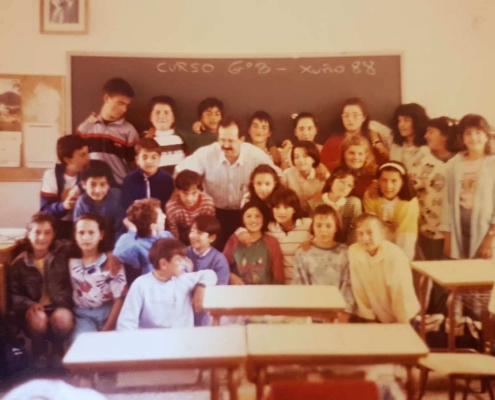
Publishes his first book for children
Publishes Os libros infantís galegos, 28 libros da literatura infantil e xuvenil galega, Para lermos cómics (‘Galician Children’s Books, 28 Galician Children’s and Young Adult Books, So that We Read Comics’, Council of Culture and Sports).
Publishes his first book for children: A cidade dos desexos (‘The City of Desires’).
Receives the Merlín Award for his novel As flores radiactivas (‘Radioactive Flowers’). He receives the news in the Intensive Care Unit in the Ferrol Hospital where he is being monitored for a coronary problem that turns out to be just a scare. Through the newspapers he also learns of the fall of the Berlin Wall.
In September and October attends the Monographic Specialist Course on “Encouraging Reading”, held at the Germán Sánchez Ruipérez Foundation in Salamanca and organised by the Xunta of Galicia’s Council of Culture and Sports. The course is of great importance in his later work.
Forms part of the group from the New Galician School movement which drafts the document Un modelo de normalización lingüística para o sistema educativo galego (‘A Model of Linguistic Standardisation for the Galician Education System’).
1989
1990
Ler en galego
Publishes Ler en galego. Estratexias e libros para a animación á lectura dende as aulas (‘Reading in Galician. Strategies and Books to Encourage Reading from the Classroom’, Ir Indo) and As flores radioactivas, which is republished in a renewed edition in 2013.
Receives the Lazarillo Prize for his book of short stories Contos por palabras (‘Stories by Words’), the first time the prize is awarded to an original work not written in Castilian.
The textbook Canles 5 receives the Emilia Pardo Bazán Prize for Non-Sexist Textbooks.
Contos por palabras, encouraging reading and comics
Publishes Contos por palabras and the essays “Animación á lectura” (‘Encouraging Reading’) and “Facermos cómics” (‘Let’s Make Comics’).
Moves to Pontedeume.
In October he is invited to take part in the 4th Communication Conference organised by the Press Association of the La Rábida Hispanic-American University Group.
In December he graduates with a Master’s in Co-Education from the University of Barcelona, directed by Mary Nash. His final dissertation was entitled “Masculine and Feminine Stereotypes in Children’s and Young Adult Literature.”
1991
1992
Contos por palabras is added to the IBBY Honours List
Publishes Os cómics nas aulas (‘Comics in the Classroom’) and O tesouro do dragón Smaug (‘The Treasure of Smaug the Dragon’).
Writes the essay “Twenty-Two Fragments” for the exhibition catalogue on Miguelanxo Prado’s work, on show at the Kiosco Alfonso in A Coruña.
Contos por palabras is added to the IBBY Honours List. Consequently, Agustín travels to the IBBY Congress in Berlin where he speaks on behalf of all the honoured authors.
Recieves the Ourense Comic Award for his body of work on comics.
Moves to Vigo with his family
Publishes Rapazas (‘Raptors’) and Fantasmas no corridor (‘Ghosts of the Corridor’).
Contributes to the volume A lingua galega no PEC e no PCC (‘The Galician Language Not in the School Education Project and Not in the School Curriculum Project’).
Moves to Vigo with his family.
Obtains a position at the Igrexa-Valadares School in Vigo.
Selected for the post of Galician Teaching Coordinator in the General Department of Linguistic Policy, a post he holds for several academic years.
1993
1994
Edebé Juvenil award
Receives the Edebé Juvenil Prize for the novel Trece anos de Branca (‘Thirteen Years of Branca’), published in the same year.
Promotes and coordinates the campaign En galego vivo Vigo, en galego Vigo vou (‘In Galician I Experience Vigo, In Galician to Vigo I Go’), aimed at teachers in the city of Vigo.
Participates in the 24th IBBY Congress held in Seville, presenting a paper on the situation of Galician children’s and young adult literature.
Against Invisibility
Publishes Cartas de inverno (‘Winter Letters’), which in the same year receives the Rañolas Prize. Also publishes Amor dos quince anos, Marilyn (‘Love at Fifteen, Marilyn’), a work which pays homage to the centenary of the birth of cinema, an art which is of great importance in his life.
Joins the official national Teaching Body of Secondary Education. His first destination is the San Tomé de Freixeiro Secondary School in Vigo.
At the Germán Sánchez Ruipérez Foundation annual symposium, presents the paper “Against Invisibility” to denounce the social invisibility of children’s and young adult literature, paying particular attention to the context of Galician sociolinguistics.
1995
1996
1997
1998
Raíña Lupa award
Publishes O laboratorio do doutor Nogueira (‘Doctor Nogueira’s Laboratory’).
Receives the first ever Raíña Lupa Prize from the Diputación of A Coruña (the provincial authority) for Cos pés no aire (‘Feet in the Air’).
Promotes and directs a campaign to encourage reading entitled “A maxia das palabras” (‘The Magic of Words’), aimed at pre-schoolers and primary pupils in Galicia.
In November travels to Porto to take part in the 4th Luso-Galician-Francophone Encounters for Children’s and Young Adult Literature.
Teacher at the Os Rosais-2 Secondary School in Vigo
Publishes Cos pés no aire, As fadas verdes (‘The Green Fairies’), A nube de cores (‘The Cloud of Colours’) and the essay A literatura infantil e xuvenil en galego (‘Children’s and Young Adult Literature in Galician’).
Becomes a teacher of Galician Language and Literature at the Os Rosais-2 Secondary School in Vigo, where he remains until his retirement.
Participates in the round table “Current Situation of Galician Children’s and Young Adult Literature: Challenges for the New Millennium’” as part of the 1st International Congress of the National Research Association for Children’s and Young Adult Literature, “Current Trends”, organised by the University of Vigo.
Travels to Vitoria-Gasteiz to participate in the “Literature and School” training days organised by Galtzagorri Elkartea.
1999
2000
Aire negro and O soño do merlo branco
Publishes Aire negro (‘Black Air’) and O soño do merlo branco (‘The White Blackbird’s Dream’).
In October participates in the “Galician and Northern Portuguese Literature. Books and Reading” conference in Santiago de Compostela, organised by the Council of Culture, Social Communication and Tourism of the Xunta of Galicia.
Chairegas Day of Arts
Publishes Ana e o tren máxico (‘Anna and the Magic Train’), No corazón do bosque (‘In the Heart of the Forest’) and Un tren cargado de misterios (‘A Train Loaded with Mysteries’).
Aire negro receives the Catalan Protagonista Jove Prize and is included on the White Ravens list from the Munich Library.
The local authorities of the A Terra Chá region in Galicia dedicate the Chairegas Day of Arts to Agustín.
Publication of the French translation of Contos por palabras.
2001
2002
Protagonista Jove Prize
Publishes Noite de voraces sombras (‘Night of Voracious Shadows’).
Finalist for the Protagonista Jove Prize for Amb els peus enlaire (‘Feet in the Air’).
Finalist for the National Award for Children’s and Young Adult Literature for No corazón do bosque.
Aire negro features on the IBBY Honour List.
In June travels to Santander to deliver a session entitled “Encouraging Reading” on the course “Children’s and Young Adult Literature. A Resource to Promote Reading”, organised by the Higher Institute of Teacher Training.
In September participates in the congress “Narrative and Promoting Reading in the World of New Technologies” in Santiago de Compostela, organised by GÁLIX and OEPLI.
In November presents the paper “Literature Which Children Can Read As Well” in the 1st Writers Congress, held in A Coruña.
2003
2004
Best Author of the Year
Publishes Tres pasos polo misterio (‘Three Steps to the Mystery’), Raquel ten medo (‘Rachel Is Afraid’) and Laura e os ratos (‘Laura and the Rats’).
Receives the Irmandade do Libro Prize 2003 for Best Author of the Year from the Galician Booksellers Federation.
Avenida do parque, 17 is translated into Arabic.
O meu nome é Skywalker is published in Korean and features on the Munich Library White Ravens list.
In July delivers the class “Stories by Words: The Creation of Stories Based on the Pages of a Newspaper” on the course “Press, School and Childhood” at the Journalism Faculty of the University of Santiago de Compostela.
Participates as a spokesperson of the Sectorial Commission for Education, the Family and Youth as part of the General Plan for the Standardisation of the Galician Language from the Xunta of Galicia.
Delivers the opening speech at the Santiago Book Fair.
Bologna Book Fair
Publishes A noite dos animais (‘Night of the Animals’), A escola dos piratas (‘The Pirate School’, Edebé Children’s Award), A fuxida do mar (‘The Disappearance of the Sea’) and ¡Que medo, mamá Raquel! (‘I’m Scared, Mama Rachel!’).
Participates in the Bologna Book Fair, invited by the Ministry of Culture.
Delivers the course “Education for Gender Equality” at the Distance Education University.
In November participates in the 11th Symposium on Children’s Literature and Reading Around Quixote. Reading, School and Childhood, organised by the Germán Sánchez Ruipérez Foundation. Presents the paper “The Current Voice of the Classics”.
2005
2006
His mother passes away
Publishes Corredores de sombra (‘Corridors of Shadow’), Un radiante silencio (‘A Radiant Silence’), Querido inimigo (‘Dear Enemy’) and Os gardiáns do bosque (‘The Guardians of the Forest’).
In April travels to Copenhagen.
In May his mother passes away.
Delivers the opening speech at the Viveiro Book Fair.
In September travels to Salvador de Bahia in Brazil to speak at the round table “Galician Culture and External Protection”.
Receives the GÁLIX Good Reads Award for Raquel ten medo.
In July presents the lecture “As If It Were Water. Narration and Writing” and the workshop “Reading and Writing: Two Tools to Change the World” as part of the course “Learning to Narrate: Practising Expression” in Madrid, organised by the Higher Institute of Teacher Training.
Teaching retirement
Publishes O único que queda é o amor (‘The Only Thing Left Is Love’).
Inauguration of the Agustín Fernández Paz Library at the Auga da Laxe de Gondomar Secondary School.
Awarded the Frei Martiño Sarmiento Prize for Corredores de sombra.
Receives the Xosé Neira Vilas Prize from the Galician Language Writers Association for O único que queda é o amor.
Awarded the Barco de Vapor Silver Plaque for Las hadas verdes.
On 15th February presents the paper “The Landscapes of Memory” in Gijón.
In June Agustín decides to retire from his teaching work. Attends the graduation ceremony at the Os Rosais-2 Secondary School in Vigo, where he gives a speech entitled “Change the World and Change Your Life”.
In October delivers a paper at the 2nd Children’s and Young Adult Literature Congress organised by the Grupo Editorial Luis Vives in Baeza (Jaen).
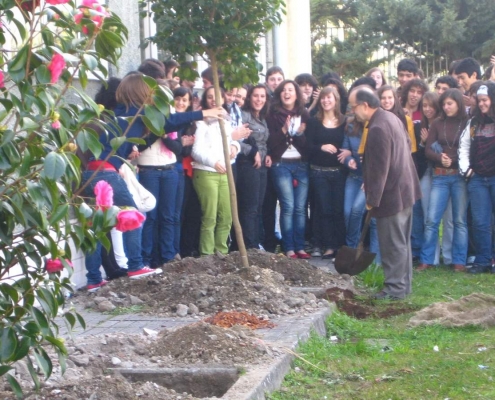
2007
2008
Awards, recognitions and tributes
Publishes A pastelería de dona Remedios (‘Doña Remedios’ Bakery’) and UPA! (‘Up!’)
National Award for Children’s and Young Adult Literature for O único que queda é o amor.
OEPLI nominee for the Astrid Lindgren Memorial Award 2008.
The Galician Editors Association names Agustín Best Author of the Year.
The Galician Language Writers Association selects O único que queda é o amor as Best Children’s and Young Adult Book of 2007.
In February travels to Havana to participate in the International Book Fair.
In October Agustín is the author chosen by the Friends of Children’s and Young Adult Books Association to write the manifesto for National Library Day. The text, “Where There Is a Library There Is a Light”, is distributed with an illustration by Xosé Cobas.
On 15th December he is paid homage by the Manuel María Foundation, which dedicates the third literary hectometre known as the Paseo dos Soños (‘Walk of Dreams’) to him, held around Muíño do Rañego in Vilalba.
More recognitions
Publishes Lúa do Senegal (‘Senegal Moon’), Valados (‘Barriers’) and A Dama da Luz (‘The Lady of Light’).
The Agustín Fernández Paz Library is inaugurated at the A Maía Primary School in Bertamiráns-Ames.
The Galician Language Writers Association awards him the “Letter E”, an annual accolade given in recognition of an author’s entire writing career. The ceremony is held at the Culture and Leisure Centre in Vilalba, where Agustín gives a speech entitled “Vilalba, The Centre of My World”.
Chairman of the 26th Xerais Awards. Gives the speech “Eight Donations for San Símon Island”.
Second nomination from the OEPLI for the Astrid Lindgren Memorial Award 2009.
Awarded the Frei Martiño Sarmiento Prize for O único que queda é o amor.
Participates in the creation of ProLingua, a public platform in defence of the Galician language.
2009
2010
Rejects the Cultura Galega das letras Award
Publishes O Raio Veloz (‘Lightning Quick’).
Named “Lugo Citizen of the Year” by the Lugo Press Association.
The Xunta of Galicia awards Agustín the Galician Cultural Award for Arts, which he rejects in protest against the aggressive policies towards the Galician language and culture by the Partido Popular government of Galicia.
Third nomination by the OEPLI for the Astrid Lindgren Memorial Award 2010.
Lúa do Senegal is voted Best Children’s and Adult Literature Book of the Year by the Galician Language Writers Association.
Paid homage at the Pontevedra Book Fair, where there is an exhibition on his work.
Honourable Mention in the SM Ibero-American Awards.
Contos por palabras is selected as one of the essential books in 20th-century Spanish children’s and young adult literature by a panel of experts at the first Language and Literature for Children and Young Adults Congress in Santiago, Chile.
A escola dos piratas is published in Korean.
O único que queda é o amor features on the IBBY Honour List.
Reading to change the world
Publishes Fantasmas de luz (‘Ghosts of Light’), Non hai noite tan longa (‘There Is No Light So Long’) and Corazón de pedra (‘Heart of Stone’).
OEPLI nominee for the Astrid Lindgren Memorial Award 2011.
Selected by the OEPLI as the Spanish candidate for the Andersen Award 2012.
O único que queda é o amor is published in Korean.
The company ARTESTUDIO premieres the stage version of Valados.
Awarded the 7th SM Ibero-American Award for Children’s and Young Adult Literature in recognition of his literary career. Travels to Mexico to receive the award at the International Book Fair in Guadalajara. Gives the speech “Reading to Change the World”.
On 4th June receives recognition from the Coordinator of Linguistic Standardisation Teams in Santiago de Compostela for his precursory work in the standardisation of the Galician language.
2011
2012
Promoting the Galician language.
Publishes Malos tempos para os fantasmas (‘Hard Times for Ghosts’, a new, completely rewritten version of Avenida do Parque, 17), Zeralda e o dragón (‘Zeralda and the Dragon’, a renewed version of O tesouro do dragón Smaug), As fronteiras do medo (‘The Frontiers of Fear’) and the book of essays O rastro que deixamos (‘The Traces We Leave Behind’).
Non hai noite tan longa recibe el Premio Antón Losada Diéguez de Creación Literaria, que se suma a otros que lo reconocen como el mejor libro de 2011: Ánxel Casal, , Fervenzas Literarias y Redelibros.
Non hai noite tan longa receives the Antón Losada Diéguez Prize for Literary Creation, one of several Best Book of 2011 accolades. The others are the Ánxel Casal Prize, the Irmandade do Libro Price, the Fervenzas Literarias Prize and the Redelibros Prize.On 30th June Agustín is paid homage at an event organised by the public platform Prolingua in recognition of his professional career as an educator and prolific writer and of his life’s work, acknowledging his commitment to promoting the Galician language.
Awarded the Ramón Piñeiro Facer País Prize from the Val de Láncara Cultural Association.
In September, Ramón Llorens, a lecturer at the University of Alicante, presents a portal dedicated to Agustín in the Miguel de Cervantes Virtual Library as part of the 9th Continuous Learning Course at the University of Santiago.
GÁLIX Honourable Member 2012. The laudatio is delivered by Paz Raña Lama, the author’s mentor and co-worker in state education for many years. Attendees are given an edition of the short story “Abrir as portas” (‘Opening Doors’).
On 7th November the Agustín Fernández Paz Library is inaugurated at the Ponteareas Secondary School.
Recipient of the Galician Language Writers Association Prize and the Crítica Galicia Award in the category of Literary Creation for Fantasmas de luz.
Doctor Honoris Causa
Publishes Desde unha estrela distante (‘From a Distant Star’).
On 28th January he is awarded the title of Doctor Honoris Causa by the University of Vigo.
O rastro que deixamos receives the Ánxel Casal Prize from the Galician Editors Association and the Fervenzas Literariars Prize for Best Book of Essays. The latter also recognises him as Best Author of the Year.
In March he delivers the speech “The Construction of the Reader / This Is Where We Come In” at the closing conference of the School Library Improvement Plan 2012-2013 Congress in Santiago de Compostela, organised by the School Library Advisory Board of the Council of Culture, Education and University Ordination.
Named Honourable Member of the New Galician School pedagogical renewal movement as part of its 30th anniversary celebrations in recognition of his professional career and his fight for a free, democratic and secular education in Galician.
In November participates in the “Illustrated Albums. Educating the Gaze” conferences organised by the Germán Sánchez Ruipérez Foundation at the Casa del Lector in Madrid, delivering the paper “Reading, the Silent Revolution”.
OEPLI candidate for the fourth time for the Astrid Lindgren Memorial Award 2013.
2013
2014
Recognition of his literary career
Publishes A viaxe de Gagarin (‘Gagarin’s Journey’).
On 29th June receives the Trasalba Prize from the Otero Pedrayo Foundation in recognition of his literary career, his commitment to language and his active participation in pedagogical renovation movements. The laudatio is delivered by the writer Francisco Castro. The book Agustín Fernández Paz. Na casa da esperanza (‘The House of Hope’) is presented at the ceremony.
OEPLI candidate for the fourth time for the Astrid Lindgren Memorial Award 2014.
Selected by the OEPLI as the Spanish nominee for the Andersen Award 2015.
The magazine Peonza dedicates a monographic issue to Agustín.
More recognitions
Publishes A neve interminable (‘The Interminable Snow’), Amizades secretas (‘Secret Friendships’) and O segredo da Illa Negra (‘The Secret of Black Island’).
A viaxe de Gagarin is awarded the Ánxel Casal Prize by the Galician Editors Association, the Fervenzas Literarias Prize, the Galician Language Writers Association Award and the Crítica Galicia Award for Literary Creation for Best Narrative Book of 2014.
Named Author of the Year 2014 on the Fervenzas Literarias web portal.
Receives the Reading Clubs Award 2015 given by the Council of Culture and Education for being the most widely read author in reading clubs during the 2013-14 academic year.
2015
2016
He passes away
On 12th July Agustín passes away at his family home in Vigo, in the presence of his daughter Mariña and his wife Inma, following a long illness which he fought against with integrity and optimism, remaining intellectually active during seven years of having cancer with metastasis. The following day he was remembered at a crowded public event. His body was cremated and his ashes were taken to Vilalba.
In November his last two books were published: A casa do medo (‘The House of Fear’), which was presented at the Fogar School in Santa Margarida as part of a remembrance ceremony for the author, and O soño do Merlo Branco (‘The White Blackbird’s Dream’, Edicións Xerais).
The traces we leave behind
On 17th February a ceremony entitled “The Traces We Leave Behind” took place at the Caranza Auditorium in Ferrol to pay tribute to his memory.
The IESCHA (Instituto de Estudios Chairegos), the Cocello of Vilalba and Edicións Xerais de Galicia create the Agustín Fernández Paz Prize for children and youth’s Narrative in their memory.
2017
About the author
AFP (Vilalba, 1947) is one of the best known and most valued writers in the field of children’s and young adults’s literature in Galicia and the rest of Spain. He is the author of more than forty-five titles mainly aimed at young and adolescent readers. His books, written in Galician, have also been translated into Castilian, Catalan, Basque, Korean, Portugese, French and Arabic.
Quick navigation
